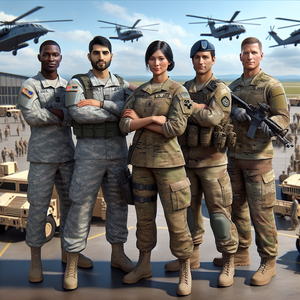
Exploring Promising Career Paths in the U.S. Army: A Comprehensive Guide
The U.S. Army offers a diverse range of career opportunities tailored to various interests and skill sets. Whether one is drawn to the thrill of combat roles or the intricacies of specialized support services, the Army has something to offer. Recently, positions in intelligence and cyber operations have garnered significant attention due to their increasing relevance in today’s digital landscape. These roles not only equip service members with cutting-edge skills but also provide a robust foundation for future civilian careers.
Job Summaries:
Intelligence Analyst (35F):
- Intelligence Analysts play a vital role in military operations by collecting and analyzing data to produce comprehensive intelligence reports.
- They assess potential threats and collaborate with various military branches to ensure mission success.
- A degree in a relevant field and security clearance are generally required.
- Given the increasing demand for intelligence roles in both military and civilian sectors, exploring current openings can lead to rewarding opportunities.
Cyber Operations Specialist (17C):
- Cyber Operations Specialists safeguard Army networks against cyber threats and execute offensive operations when necessary.
- Daily responsibilities include monitoring network security, analyzing vulnerabilities, and implementing defensive strategies.
- Candidates often possess backgrounds in computer science or cybersecurity, along with relevant certifications.
- This position is crucial for modern military strategies, appealing to those with a passion for technology and innovation.
Combat Medic (68W):
- Combat Medics deliver essential medical care in high-pressure environments.
- Assessing injuries and administering life-saving treatments are key responsibilities.
- Required training includes specialized medical courses and certification in basic life support.
- Experience gained in this role is highly regarded in civilian healthcare careers.
- This role is an excellent choice for those passionate about emergency medicine.
Human Resources Specialist (42A):
- Human Resources Specialists oversee personnel management, including recruitment, training, and benefits administration.
- A degree in human resources or a related discipline is beneficial, coupled with strong interpersonal skills.
- This role not only fosters leadership development but also allows individuals to make a significant impact on soldiers’ careers.
Explosive Ordnance Disposal (EOD) Specialist (89D):
- EOD Specialists are responsible for identifying and neutralizing explosives and hazardous materials.
- Their tasks range from inspections to training others in safety protocols.
- This role demands rigorous training, technical expertise, and physical fitness.
- It is one of the most respected positions in the Army.
Logistics Specialist (92A):
- Logistics Specialists ensure the smooth operation of military missions by managing supply chains, inventory, and transportation.
- A background in logistics or business, along with strong organizational skills, is typically required.
- This role not only supports military objectives but also provides skills that are highly sought after in civilian logistics careers.
Public Affairs Specialist (46S):
- Public Affairs Specialists shape the Army’s public image through media engagement and communication strategies.
- A degree in communications or journalism is often necessary, along with excellent writing skills.
- This role plays a critical part in maintaining public support and transparency.
- Making it a fulfilling career for those with a creative mindset.
Military Police (31B):
- Military Police officers uphold laws and regulations.
- Ensuring the safety of personnel and property.
- Duties include patrolling installations and investigating incidents.
- A strong ethical foundation is essential for success in this role.
- A background in law enforcement or criminal justice is essential for success in this role.
Aviation Maintenance Technician (15B):
- Aviation Maintenance Technicians are responsible for the upkeep and repair of Army aircraft.
- Ensuring compliance with safety standards.
- A technical school background in aviation maintenance and FAA certifications are typically required.
- This role is crucial for the effectiveness of Army aviation operations.
- Provides skills that are highly valued in the civilian aviation sector.
Field Artillery Officer (13A):
- Field Artillery Officers lead units in planning and executing fire support operations.
- This role necessitates strong leadership and strategic skills.
- A degree in a related field is required.
- Completion of Officer Candidate School (OCS) is necessary.
- Field Artillery Officers are central to battlefield operations.
- This role offers an exciting career path for those interested in military leadership.
Each of these roles presents distinct challenges and opportunities, enabling individuals to make meaningful contributions to the Army's mission while acquiring skills applicable in civilian life. As potential recruits contemplate their career options, it is vital to weigh personal interests and long-term benefits to identify the best fit within the Army. With pathways ranging from high-tech cyber operations to hands-on healthcare roles, the Army provides numerous avenues leading to fulfilling military and civilian careers. Engaging with current service members, exploring job openings, and understanding the broader impact of these roles can be invaluable steps for those considering a future in the Army.
Explore More Jobs

